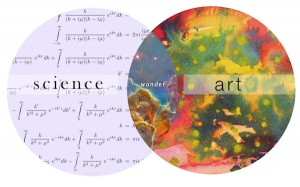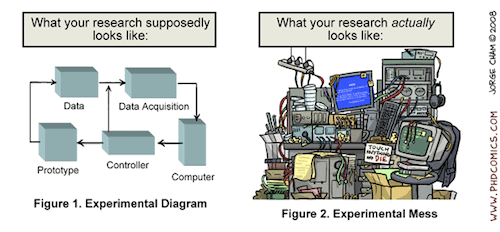Back to the subject of art and science! Since starting a discussion on this topic last month, I’ve already talked about the reading and writing aspects of the comparison between art and science. Now I’m inspired to get into another topic that has held my interest for as long as I can remember: research. How do these two sides compare when it comes to looking things up?
How the Art is like the Science

At the intersection of Art and Science lies Wonder. – The Imaginary Foundation
Research is a technique that every serious writer must master, regardless of medium. Scientists need to acquire purely factual information to form a solid foundation of credibility for their studies and continuously guide their work toward new discoveries. Journalists have to be aware of all the facts of a story in order to accurately convey the news to their readers/viewers. Even fiction writers and poets draw ideas from real life to paint a vivid image with the details in their stories and poetry. No matter what we choose to write, we should always do at least a little research to make our work believable, and that’s why the best writers do well to keep reference books, articles, and search engines handy at all times.
What makes most literature relatable is that no matter how fantastic the details may be, there’s always some base of truth with which the reader can connect, whether it’s the spectrum of emotions shown by fictional characters or world news that directly or indirectly affects us. As writers, it’s up to us to curate the ideas we want to share with our audience and present them in a way that makes our writing fresh and interesting, for fiction and non-fiction alike.
Research is a universal term for looking up information that we can put to good use. The differences, however, lie in the purposes of this practice…
How the Art is unlike the Science
Artistic writing is widely popular as an escape from reality for the fascinating stories one can only find in fiction. That being said, a writer can’t expect for more than a handful of readers to enjoy their work unless they can somehow bridge the gap between the fictional world of their stories and the real world of their audience. This is where research plays a key role. Writers of historical fiction have to know as many specific details as possible of the past events around which they construct their tales. Science fiction writers should have at least a basic understanding of real scientific principles before attempting to pass their stories off as even remotely plausible. Murder mysteries and thrillers rely on plots that could happen in real life in order to achieve their full effect, and romance novelists need to understand human nature and relationships if they want to make their characters relatable. Research is important for all forms of artistic writing, and fiction writers who master it will find their craft all the more enriching for it.

(Courtesy of PHD Comics)
Scientific writing, on the other hand, thrives on research taken to a whole other level. While research for writing may be optional for many artists, it is unequivocally mandatory for scientists. Not only are we expected to read everything related to our field of interest, but we have to do so before we even think about writing our own work! If I learned anything from my first years as a Biology student, it’s that you can’t expect to make it in the scientific community unless you’re constantly reading. Academic papers, books, news articles, any source of information relevant to your studies can and should be perused. Science is all about the progression of knowledge, and in the modern age of the Internet, new information is emerging faster than ever: every week, in fact, if not every single day. In short, research is an enhancement that artists choose to pursue, but lack of research is a hindrance that scientists cannot afford.
Like many aspects of writing, research is something of an art and a science itself. It may not be easy for every writer to acquire the habit, but once you get the hang of it, you’ll find that research is an invaluable practice that will help you connect with your readers and elevate your writing to wonderful new heights. Best of luck! Thanks for reading!


Reading, reading…. my years as a scientist were nothing but reading and the number of graduates who I met who hadn’t anticipated that is how they would spend their time, not in a lab or field, but nose in a book or article. Now, it’s done me a favour, because I do understand research and how it applies to writing fiction as much as non-fiction.
Haha, I know what you mean! I learned a lot about scientific research in college, and I’m sure all that practice has helped enhance my creative writing as well. Thanks for reading and following! 🙂